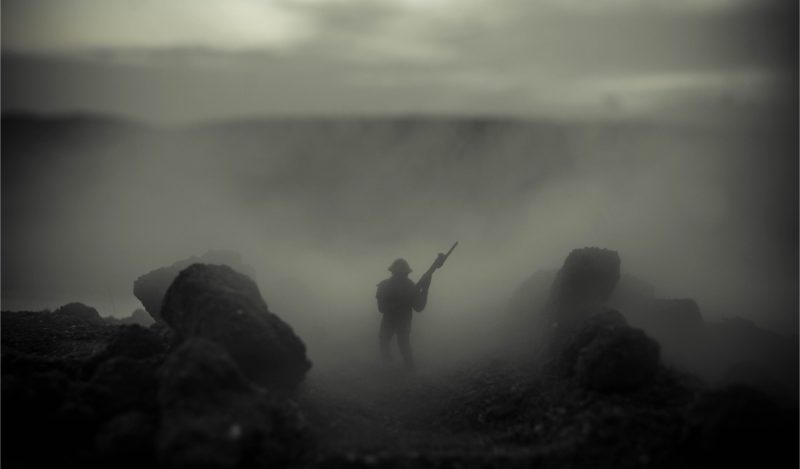On August 6, 1945, an American B-29 bomber, named Enola Gay, dropped the world’s first atomic bomb weapon known as “Little Boy” on the Japanese city of Hiroshima. Three days later on August 9, 1945 a second B-29 bomber, named Bockscar, dropped another A-bomb named “Fat Man” on Nagasaki.
Estimates of the true number killed have varied. The US Joint Commission of 1945 estimates of deaths in Hiroshima at 64,500 (25.5% of the population) by mid-November 1945. In Nagasaki, an estimated 39,214 (20.1%) died. A 1977 re-estimation of deaths from the atomic bombs resulted in a range between 110,000-210,000 killed in both Hiroshima and Nagasaki. That study showed there were significant methodological errors with the Joint Commission report.
Following the atomic bombings, Emperor Hirohito surrendered in a speech made on August 15, 1945. Traditionalists believe the dropping of not one but two atomic bombs was justified in that “millions of Allied lives were saved” by avoiding an invasion of Japan planned for November 1945.
What many people do not realize is that Emperor Hirohito was already considering surrender before the atomic bombs were dropped. This was in large part due to the extensive damage inflicted by widespread US firebombing.
In March of 1945 over 300 B-29 superfortresses dropped napalm incendiary bombs on Tokyo and 66 other Japanese cities. The goal of the Tokyo firebombing was to damage the warfare infrastructure as well as break the will of the Japanese people. The firebombing of Tokyo was the most destructive bombing raid in human history, and those who survived were left devastated.
General Curtis LeMay, who oversaw the firebombing said “If we’d lost the war, we’d all have been prosecuted as war criminals.” Following the firebombing Hirohito and other military leaders contemplated but delayed capitulating to Allied forces as they needed a way to save face and prevent an internal challenge by the Japanese people.
Why am I writing about WWII history? Other than the fact that I am working with an author on a WWII history book, there are many lessons to be learned when we examine the conduct of war through the lens of today.
In The Fog of War film, Robert McNamara outlined the “lessons” of war. Lesson No.5 is pertinent even today: “Proportionality should be a guideline in war.”
The response of governments to the pandemic (war) have not been proportional to the threat as the pandemic has evolved.
Our representatives and public health agencies have repeatedly violated the rule of proportionality and those who continue to do so without guidance from data on masking, mandates and vaccine effectiveness against Omicron must be called out on this. How many jobs have been lost because of lockdowns and then inappropriate vaccine mandates?
How lasting will the negative impact from subpar virtual education be on children? What are the mental health and PTSD-like implications of many who continue to suffer agoraphobic tendencies thanks to a fear-mongering biased media? When will we stop the red versus blue contentious battle applied to nearly every emotion-driven narrative of late?
Recently published models on how many lives have been saved by vaccines are fraught with inaccuracy but used as justification for current policy decisions. They make claims that repeated infections carry higher mortality but the internal and external validity of the study they quote is questionable.
At the FDA VRBPAC and CDC ACIP meetings data from a preprint on SARS-CoV-2 mortality in children was presented as justification for vaccinating young children. That preprint was found to be inaccurate and corrected by the authors but the CDC and FDA have yet to issue their own corrections.
Certainly, one could say we are in the midst of the “fog of war” where error judgments can be made but we have seen far too many of them over the past 2.5 years. Shouldn’t we be able to obtain accurate data in the age of digital information? These errors or omissions, pervasive agency capture and manipulation have resulted in a loss of faith in our institutions of science and health. Not a good place to be.
By using WWII history to make this point I am by no means besmirching the Greatest Generation, who heard and responded to the rallying call at home and abroad. I have the utmost respect for those who fought and never came home, including my own family members.
It is their leaders who, like the leaders of today, I hold in contempt. Some misled and some continued to protect their own reputations or legacies at the expense of the people. The parsing of information (or government sponsored misinformation) is not unlike Emperor Hirohito giving his surrender speech in a formal court dialect so that the majority of the “common” Japanese people did not understand for days afterwards.
At what point will elected officials and appointed public health leaders fess up to their errors and reverse course? Perhaps like Curtis LeMay, they fear confessing their errors as they will be prosecuted. Or like Emperor Hirohito they are waiting for something that helps them save face while avoiding an uprising of the masses. Either way we lose.
Join the conversation:


Published under a Creative Commons Attribution 4.0 International License
For reprints, please set the canonical link back to the original Brownstone Institute Article and Author.









